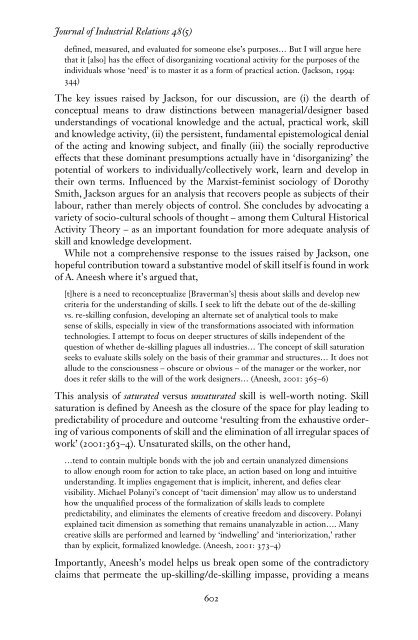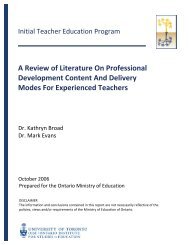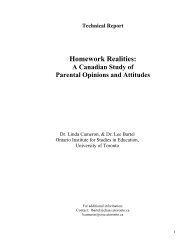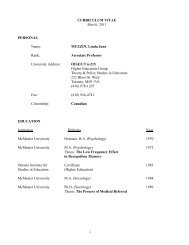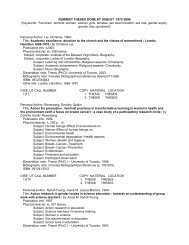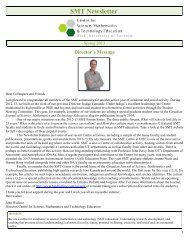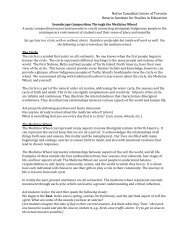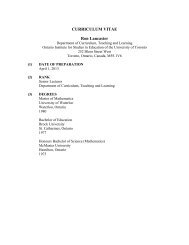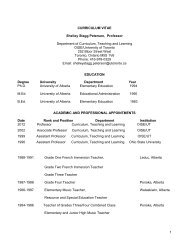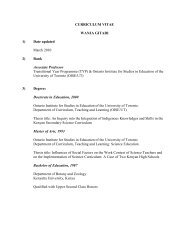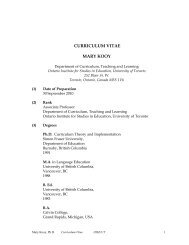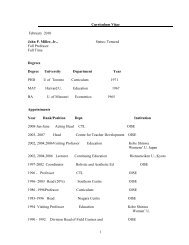'Use-Value' and the Re-thinking of Skills, Learning and the Labour ...
'Use-Value' and the Re-thinking of Skills, Learning and the Labour ...
'Use-Value' and the Re-thinking of Skills, Learning and the Labour ...
You also want an ePaper? Increase the reach of your titles
YUMPU automatically turns print PDFs into web optimized ePapers that Google loves.
Journal <strong>of</strong> Industrial <strong>Re</strong>lations 48(5)defined, measured, <strong>and</strong> evaluated for someone else’s purposes… But I will argue herethat it [also] has <strong>the</strong> effect <strong>of</strong> disorganizing vocational activity for <strong>the</strong> purposes <strong>of</strong> <strong>the</strong>individuals whose ‘need’ is to master it as a form <strong>of</strong> practical action. (Jackson, 1994:344)The key issues raised by Jackson, for our discussion, are (i) <strong>the</strong> dearth <strong>of</strong>conceptual means to draw distinctions between managerial/designer basedunderst<strong>and</strong>ings <strong>of</strong> vocational knowledge <strong>and</strong> <strong>the</strong> actual, practical work, skill<strong>and</strong> knowledge activity, (ii) <strong>the</strong> persistent, fundamental epistemological denial<strong>of</strong> <strong>the</strong> acting <strong>and</strong> knowing subject, <strong>and</strong> finally (iii) <strong>the</strong> socially reproductiveeffects that <strong>the</strong>se dominant presumptions actually have in ‘disorganizing’ <strong>the</strong>potential <strong>of</strong> workers to individually/collectively work, learn <strong>and</strong> develop in<strong>the</strong>ir own terms. Influenced by <strong>the</strong> Marxist-feminist sociology <strong>of</strong> DorothySmith, Jackson argues for an analysis that recovers people as subjects <strong>of</strong> <strong>the</strong>irlabour, ra<strong>the</strong>r than merely objects <strong>of</strong> control. She concludes by advocating avariety <strong>of</strong> socio-cultural schools <strong>of</strong> thought – among <strong>the</strong>m Cultural HistoricalActivity Theory – as an important foundation for more adequate analysis <strong>of</strong>skill <strong>and</strong> knowledge development.While not a comprehensive response to <strong>the</strong> issues raised by Jackson, onehopeful contribution toward a substantive model <strong>of</strong> skill itself is found in work<strong>of</strong> A. Aneesh where it’s argued that,[t]here is a need to reconceptualize [Braverman’s] <strong>the</strong>sis about skills <strong>and</strong> develop newcriteria for <strong>the</strong> underst<strong>and</strong>ing <strong>of</strong> skills. I seek to lift <strong>the</strong> debate out <strong>of</strong> <strong>the</strong> de-skillingvs. re-skilling confusion, developing an alternate set <strong>of</strong> analytical tools to makesense <strong>of</strong> skills, especially in view <strong>of</strong> <strong>the</strong> transformations associated with informationtechnologies. I attempt to focus on deeper structures <strong>of</strong> skills independent <strong>of</strong> <strong>the</strong>question <strong>of</strong> whe<strong>the</strong>r de-skilling plagues all industries… The concept <strong>of</strong> skill saturationseeks to evaluate skills solely on <strong>the</strong> basis <strong>of</strong> <strong>the</strong>ir grammar <strong>and</strong> structures… It does notallude to <strong>the</strong> consciousness – obscure or obvious – <strong>of</strong> <strong>the</strong> manager or <strong>the</strong> worker, nordoes it refer skills to <strong>the</strong> will <strong>of</strong> <strong>the</strong> work designers… (Aneesh, 2001: 365–6)This analysis <strong>of</strong> saturated versus unsaturated skill is well-worth noting. <strong>Skills</strong>aturation is defined by Aneesh as <strong>the</strong> closure <strong>of</strong> <strong>the</strong> space for play leading topredictability <strong>of</strong> procedure <strong>and</strong> outcome ‘resulting from <strong>the</strong> exhaustive ordering<strong>of</strong> various components <strong>of</strong> skill <strong>and</strong> <strong>the</strong> elimination <strong>of</strong> all irregular spaces <strong>of</strong>work’ (2001:363–4). Unsaturated skills, on <strong>the</strong> o<strong>the</strong>r h<strong>and</strong>,…tend to contain multiple bonds with <strong>the</strong> job <strong>and</strong> certain unanalyzed dimensionsto allow enough room for action to take place, an action based on long <strong>and</strong> intuitiveunderst<strong>and</strong>ing. It implies engagement that is implicit, inherent, <strong>and</strong> defies clearvisibility. Michael Polanyi’s concept <strong>of</strong> ‘tacit dimension’ may allow us to underst<strong>and</strong>how <strong>the</strong> unqualified process <strong>of</strong> <strong>the</strong> formalization <strong>of</strong> skills leads to completepredictability, <strong>and</strong> eliminates <strong>the</strong> elements <strong>of</strong> creative freedom <strong>and</strong> discovery. Polanyiexplained tacit dimension as something that remains unanalyzable in action…. Manycreative skills are performed <strong>and</strong> learned by ‘indwelling’ <strong>and</strong> ‘interiorization,’ ra<strong>the</strong>rthan by explicit, formalized knowledge. (Aneesh, 2001: 373–4)Importantly, Aneesh’s model helps us break open some <strong>of</strong> <strong>the</strong> contradictoryclaims that permeate <strong>the</strong> up-skilling/de-skilling impasse, providing a means602


